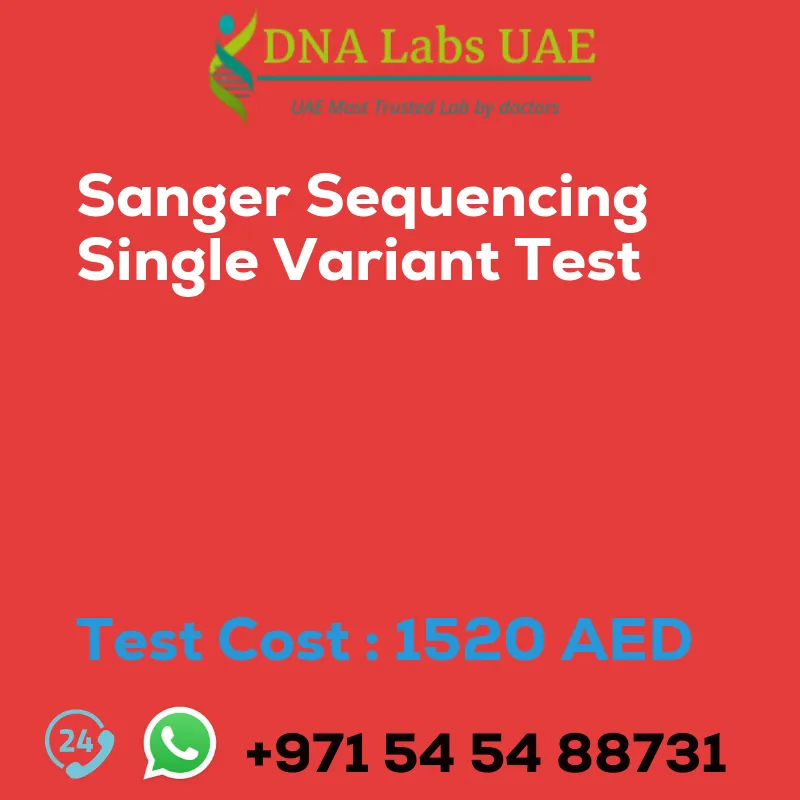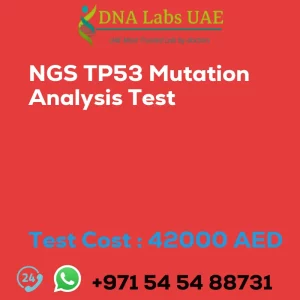Sanger Sequencing Single Variant Test – DNA Labs UAE
Test Details
Sanger sequencing is a widely used method for DNA sequencing. In the context of single variant testing, Sanger sequencing can be used to identify and confirm the presence of a specific genetic variant in a DNA sample.
Test Name
SANGER SEQUENCING SINGLE VARIANT Test
Components
Price: 1520.0 AED
Sample Condition
Submit 10 mL (5 mL min.) whole blood from 2 Lavender Top (EDTA) tubes. Ship refrigerated. DO NOT FREEZE. Duly filled Sanger Sequencing Test Requisition Form (Form 38) is mandatory.
Report Delivery
Sample Daily by 9 am; Report 30 Working days
Method
Sanger sequencing
Test Type
Genetic Disorders
Doctor
Pediatrician
Test Department
MOLECULAR DIAGNOSTICS
Pre Test Information
Duly filled Sanger Sequencing Test Requisition Form (Form 38) is mandatory.
Test Process
- DNA extraction: The DNA of interest is extracted from the sample, typically from blood, saliva, or tissue.
- PCR amplification: The specific region of the DNA containing the variant of interest is amplified using polymerase chain reaction (PCR). This step ensures that there is enough DNA for subsequent sequencing.
- Sequencing reaction: The amplified DNA is then subjected to a sequencing reaction, where a DNA polymerase enzyme incorporates fluorescently labeled nucleotides into the growing DNA strand. The reaction includes a small amount of dideoxynucleotides (ddNTPs), which terminate the DNA strand at specific positions.
- Capillary electrophoresis: The resulting mixture of DNA fragments, each terminating at different positions due to the incorporation of ddNTPs, is loaded onto a capillary electrophoresis instrument. This instrument separates the DNA fragments based on size and detects the fluorescent signals emitted by the labeled nucleotides.
- Data analysis: The electropherogram generated by the capillary electrophoresis instrument is analyzed to determine the DNA sequence. The presence of the variant is identified by comparing the obtained sequence to a reference sequence.
Advantages and Limitations
Sanger sequencing is a reliable method for detecting single nucleotide variants (SNVs) and small insertions or deletions (indels) in a DNA sample. It is commonly used in research, clinical diagnostics, and genetic testing applications. However, it can be time-consuming and expensive compared to newer sequencing technologies such as next-generation sequencing (NGS).
| Test Name | SANGER SEQUENCING SINGLE VARIANT Test |
|---|---|
| Components | |
| Price | 1520.0 AED |
| Sample Condition | Submit 10 mL (5 mL min.) whole blood from 2 Lavender Top (EDTA) tubes. Ship refrigerated. DO NOT FREEZE. Duly filled Sanger Sequencing TestRequisition Form (Form 38) is mandatory. |
| Report Delivery | Sample Daily by 9 am; Report 30 Working days |
| Method | Sanger sequencing |
| Test type | Genetic Disorders |
| Doctor | Pediatrician |
| Test Department: | MOLECULAR DIAGNOSTICS |
| Pre Test Information | Duly filled Sanger Sequencing TestRequisition Form (Form 38) is mandatory. |
| Test Details | Sanger sequencing is a widely used method for DNA sequencing. In the context of single variant testing, Sanger sequencing can be used to identify and confirm the presence of a specific genetic variant in a DNA sample. The process involves several steps: 1. DNA extraction: The DNA of interest is extracted from the sample, typically from blood, saliva, or tissue. 2. PCR amplification: The specific region of the DNA containing the variant of interest is amplified using polymerase chain reaction (PCR). This step ensures that there is enough DNA for subsequent sequencing. 3. Sequencing reaction: The amplified DNA is then subjected to a sequencing reaction, where a DNA polymerase enzyme incorporates fluorescently labeled nucleotides into the growing DNA strand. The reaction includes a small amount of dideoxynucleotides (ddNTPs), which terminate the DNA strand at specific positions. 4. Capillary electrophoresis: The resulting mixture of DNA fragments, each terminating at different positions due to the incorporation of ddNTPs, is loaded onto a capillary electrophoresis instrument. This instrument separates the DNA fragments based on size and detects the fluorescent signals emitted by the labeled nucleotides. 5. Data analysis: The electropherogram generated by the capillary electrophoresis instrument is analyzed to determine the DNA sequence. The presence of the variant is identified by comparing the obtained sequence to a reference sequence. Sanger sequencing is a reliable method for detecting single nucleotide variants (SNVs) and small insertions or deletions (indels) in a DNA sample. It is commonly used in research, clinical diagnostics, and genetic testing applications. However, it can be time-consuming and expensive compared to newer sequencing technologies such as next-generation sequencing (NGS). |







